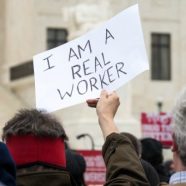
In the past three months, two unprecedented, historic events have created seismic shifts in attitudes and values around the world: the Coronavirus pandemic and the surge of the Black Lives Matter movement, following the horrific death of George Floyd in Minneapolis. Common to both is a revitalized role of the average worker or employee for shaping our views on social injustices, plus an opportunity to enhance the brand reputation of companies.
COVID-19 Hurting Service Workers Most
The Coronavirus pandemic has had an enormous impact on both social inequities and the appreciation of the average worker. This deadly disease spreads by human contact so anyone who works in an in-person environment is particularly vulnerable. And this represents the vast majority of workers in the U.S. According to the Bureau of Labor Statistics, about 86% of U.S. workers are today employed in service industry jobs, up from 68% in 1970.
Since 1980, automation has spread in the workplace and companies have sent more jobs overseas, which has basically polarized the labor market: growth at both ends, high-wage jobs that require a lot of education and also low-wage jobs for non-routine services that can’t be automated or outsourced (e.g. food preparation, waiters, taxi drivers, etc.). Most of these latter workers are in jobs that require human contact, which raises their coronavirus exposure risk.
At the same time, the public as a whole has praised the courage and commitment of all the “frontline” workers at essential services (grocery workers, packers, firefighters, etc.) and especially in healthcare – nurses, first responders, EMT’s, paramedics, etc. These workers are our new heroes. However many in these low-wage jobs belong to citizens of color who have been disproportionally hit with COVID-19, which has reminded us of the extensive, unfair inequalities in our society.
The Rise of Anti-Racism
Concurrent with this pandemic, the other global phenomenon is the recent Black Lives Matter protest, which has dramatically changed attitudes toward racism and discrimination:
- A Monmouth University poll in early June showed that 76% of Americans (including 71% of whites) called racism and discrimination a “big problem” in the U.S., up 26 percentage points since 2015.
- Separately a Pew Research poll in early June revealed that 67% of Americans (including 60% of whites) support Black Lives Matter and 61% say there’s too much economic inequality in the U.S.
- Not surprising, Millennials and Generation Z are more than twice as likely as older generations to believe that police are prone to racist behavior (PBS/Marist College poll in 2019).
The increased respect for service workers exposed to the coronavirus and this epic shift in attitudes toward social issues like discrimination, police violence and the widening inequities in our society have empowered workers throughout the business world to become more vocal and engaged. For example, the recent walkout of about 400 Facebook workers to protest the “hateful rhetoric advocating violence against black demonstrators by the U.S. President” shows their increased confidence for standing up against management’s policies and morals
New Opportunities For Company Brands
In light of these trends, companies are coming under increased scrutiny on what they say and what they stand for. Remaining silent on these social issues is no longer a safe option. A recent 2020 Pew Research poll indicated that of those who see too much economic inequality, 62% feel large businesses and corporations should be more responsible for reducing it. As more Americans demand a response from business on both the COVID-19 and Black Lives Matters crises, companies are more sensitive to how their brand reputation will be perceived by customers, the local community, the media, and especially their employees today.
These trends have created an opportunity for employees to take on a renewed, expanded role as brand ambassadors or evangelists for their companies. With social media, their demands are becoming a compelling catalyst for change. Management should recognize this opportunity as a credible way to update and communicate its brand values in response to the COVID-19 and BLM
If business and society can become more united for addressing our social challenges, it would certainly enhance a brand’s reputation. Despite all the negatives with these two situations, supporting this rise of employee evangelism can help create a new corporate culture that builds on the trending feeling that “we all in this together”.


